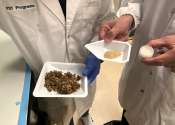How evolution has optimized the magnetic sensor in birds
Migratory birds are able to navigate and orientate with astonishing accuracy using various mechanisms, including a magnetic compass. A team led by biologists Dr. Corinna Langebrake and Prof. Dr. Miriam Liedvogel from the ...









